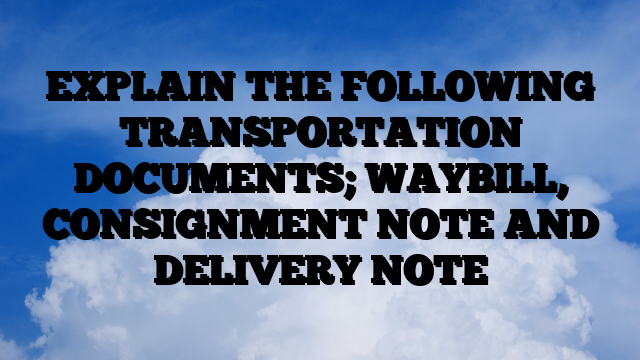Transportation documents play a crucial role in the logistics and supply chain industry by providing essential information about the movement of goods from one location to another. Three common transportation documents are the waybill, consignment note, and delivery note. Each document serves a specific purpose and contains important details related to the transportation process.
- Waybill: A waybill is a document issued by a carrier or freight forwarder that provides detailed information about a shipment. It acts as evidence of the contract of carriage and contains essential data such as the names and addresses of the shipper and consignee, description of goods, quantity, weight, mode of transport, and destination. The waybill serves as a receipt for the goods being transported and may also include terms and conditions of carriage.
- Consignment Note: A consignment note, also known as a bill of lading or airway bill, is a document issued by the carrier or its agent acknowledging the receipt of goods for transport. It serves as evidence of the contract between the shipper and carrier and contains information about the goods, their origin, destination, and the terms of carriage. The consignment note also includes details such as the name and address of the shipper and consignee, description of goods, quantity, weight, freight charges, and any special instructions.
- Delivery Note: A delivery note is a document used to confirm the receipt of goods by the recipient or consignee. It is usually prepared by the supplier or seller and accompanies the goods during transportation. The delivery note includes information such as the name and address of the supplier and customer, description of goods delivered, quantity, date of delivery, and any additional instructions or remarks. It acts as proof that the goods have been received in good condition.
These transportation documents are essential for various reasons:
- Legal Protection: Waybills, consignment notes, and delivery notes provide legal protection to both the shipper and carrier by documenting the terms and conditions of the transportation contract. They serve as evidence in case of disputes or claims related to loss, damage, or delay in delivery.
- Inventory Management: These documents help in maintaining accurate inventory records by providing details about the goods being transported. They assist in tracking and tracing shipments, ensuring proper stock management, and facilitating efficient supply chain operations.
- Customs Clearance: Waybills and consignment notes contain crucial information required for customs clearance processes. They provide details about the origin, destination, nature of goods, and their value, enabling customs authorities to assess duties and taxes accurately.
- Proof of Delivery: Delivery notes act as proof that the goods have been delivered to the intended recipient. They help in resolving disputes related to non-delivery or discrepancies in the quantity or condition of goods received.
- Billing and Payment: Transportation documents play a vital role in invoicing and payment processes. They provide the necessary information for generating accurate invoices, including freight charges, additional services, and terms of payment.



